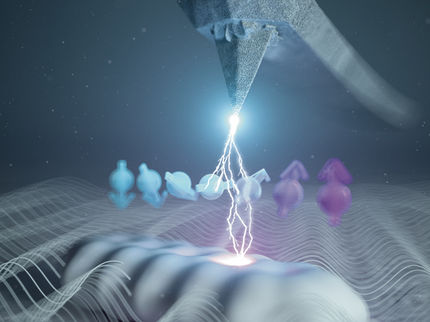Atomic traffic control
Researchers have developed + tested novel technology for even more precise quantum sensors
UNESCO's International Year of Quantum Science and Technology begins with a success for TU researchers at the Institute of Applied Physics: Physical Review Research publishes results of their research on dichroic mirror pulses. These act like velocity-selective traffic controllers for atoms by directing the particles with correct velocity towards detection while letting run troublemakers into the void.
Quantum sensors can be significantly more precise than conventional sensors and are used for e.g., earth observation, navigation, material testing, and chemical or biomedical analysis. TU Darmstadt researchers have developed and tested a technique that makes quantum sensors even more precise.
What is behind this technology? Quantum sensors, based on the wave nature of atoms, use quantum interference to measure accelerations and rotations with extremely high precision. This technology requires optimized beam splitters and mirrors for atoms. However, atoms that are reflected in unintentional ways can significantly impair such measurements.
Scientists at TU Darmstadt therefore use specially designed light pulses as velocity-selective atom mirrors, which reflect the desired atoms and allow parasitic atoms to pass through. This approach reduces the noise in the signal, making the measurements much more precise. The technique is particularly important for the latest generation of quantum sensors: To further increase the sensitivity, the transfer of exceedingly high velocities is currently being explored, which, on the other hand, introduces additional parasitic atomic paths. With the technique developed at TU Darmstadt by the research teams of Prof. Birkl and Prof. Giese this unwanted side effect can be mitigated. Specific advantages for rapid implementation arise from the fact that the “dichroic mirror pulses” can be seamlessly integrated into existing systems. This breakthrough enables researchers worldwide to push the limits of precision measurements and develop improved devices for both basic quantum-physics research and practical applications of quantum sensors.
Original publication
Other news from the department science

Get the analytics and lab tech industry in your inbox
By submitting this form you agree that LUMITOS AG will send you the newsletter(s) selected above by email. Your data will not be passed on to third parties. Your data will be stored and processed in accordance with our data protection regulations. LUMITOS may contact you by email for the purpose of advertising or market and opinion surveys. You can revoke your consent at any time without giving reasons to LUMITOS AG, Ernst-Augustin-Str. 2, 12489 Berlin, Germany or by e-mail at revoke@lumitos.com with effect for the future. In addition, each email contains a link to unsubscribe from the corresponding newsletter.

























































